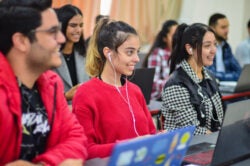Authored by
Luchen Li, Goucher College
 For international education, the coronavirus pandemic brought on a sudden need for offering new, innovative global engagement opportunities to our students and faculty. A serendipitous outcome to this challenge is that one such opportunity already existed: virtual exchange. Virtual exchange has quickened the pace of international collaboration by leveraging technology to spur a revolution and reimagine global collaboration during and after the pandemic.
For international education, the coronavirus pandemic brought on a sudden need for offering new, innovative global engagement opportunities to our students and faculty. A serendipitous outcome to this challenge is that one such opportunity already existed: virtual exchange. Virtual exchange has quickened the pace of international collaboration by leveraging technology to spur a revolution and reimagine global collaboration during and after the pandemic.
So, what is virtual exchange and how does it work? Virtual exchange uses online technology to connect people around the world to learn and work together in “virtually” the same way as if they were together in person. If you would like to conduct a business meeting, engage in a research project with colleagues, chat with a friend, or take a class with peers from another country, all you need is access to the internet. Once you’re connected through whatever platform or app you prefer, it’s almost like teleporting yourself to a different country, cultural community, lab, or classroom.
Many Goucher College students have already experienced this freedom. Goucher College requires its undergraduate students to complete a study abroad experience for their degrees. U.S. News & World Report ranks Goucher #2 for study abroad participation. We began seeking multiple alternatives to meet the study abroad requirement in the fall 2020 semester and since then, Goucher has partnered with the Stevens Initiative and one of its grantees, Soliya, to offer its students a timely solution through virtual exchange. Goucher faculty and staff have built interdisciplinary courses such as “Global Engagement Seminar” and “Practicum of Global Engagement,” which offer our students a flexible experience to build connections with the world during the pandemic. Three cohorts of Goucher students have joined in a virtual exchange, spending hours meeting with peers from the Middle East and North Africa (MENA) region and other parts of the world to discuss perceptions of global issues, such as education and climate change, from their cultural contexts. In addition to establishing a virtual opportunity to fulfill our study abroad requirement, we have also benefited in a few other ways:
- Goucher was able to establish connections with new parts of the world, such as the MENA region, which its students and faculty have desired but were unable to engage with for in-person travels.
- The virtual exchange experience has inspired faculty members to engage internationally when schedule demands prevented them from leading traditional study abroad programs.
- Virtual exchange has given Goucher faculty a discussion forum to collaborate with colleagues in Europe and Asia more frequently and productively on research, curriculum design, and pedagogy.
For us, virtual exchange is not meant to replace study abroad; instead, it complements traditional study abroad and provides all students broader access to global experiences, making international education more equitable. Virtual exchange also offers faculty the opportunities to collaborate more closely with international counterparts. For instance, our Director of Faculty Professional Development, with his counterpart at a partner institution in UK, has designed a four-hour virtual faculty development event to discuss “What We Mean When We Say Global Education.”
As you consider creating the perfect virtual exchange for your campus, I recommend reviewing your campus’ global learning mission and identifying areas where virtual exchange can help blaze a new trail for the long-desired but overdue ambitions, such as having ALL students obtain meaningful international experiences. One valuable reference is the Virtual Exchange Guide for Senior International Officers issued by the Initiative. You should also engage with institutions that have already pioneered this exciting endeavor. This can make starting virtual exchange a bit easier and can broaden an existing program’s institutional reach and global programming, not only impacting students and faculty but also staff and alumni.
Virtual exchange not only builds marketable global competencies and deepens participants’ understanding of and ability to engage with those from other backgrounds, but also helps create equity by broadening access to global education for students and faculty who otherwise would be unable to travel internationally. Most importantly, virtual exchange reveals global opportunities you may have never imagined!
Luchen Li is Associate Vice President for Global Education and Professor of Literary Studies at Goucher College in Baltimore, Maryland. Dr. Li previously served as Dean of Global Service at Northeastern University, Associate Provost for International Programs at the University of New Hampshire, and President of the International Society of Steinbeck Scholars.
 For international education, the coronavirus pandemic brought on a sudden need for offering new, innovative global engagement opportunities to our students and faculty. A serendipitous outcome to this challenge is that one such opportunity already existed: virtual exchange. Virtual exchange has quickened the pace of international collaboration by leveraging technology to spur a revolution and reimagine global collaboration during and after the pandemic.
For international education, the coronavirus pandemic brought on a sudden need for offering new, innovative global engagement opportunities to our students and faculty. A serendipitous outcome to this challenge is that one such opportunity already existed: virtual exchange. Virtual exchange has quickened the pace of international collaboration by leveraging technology to spur a revolution and reimagine global collaboration during and after the pandemic.